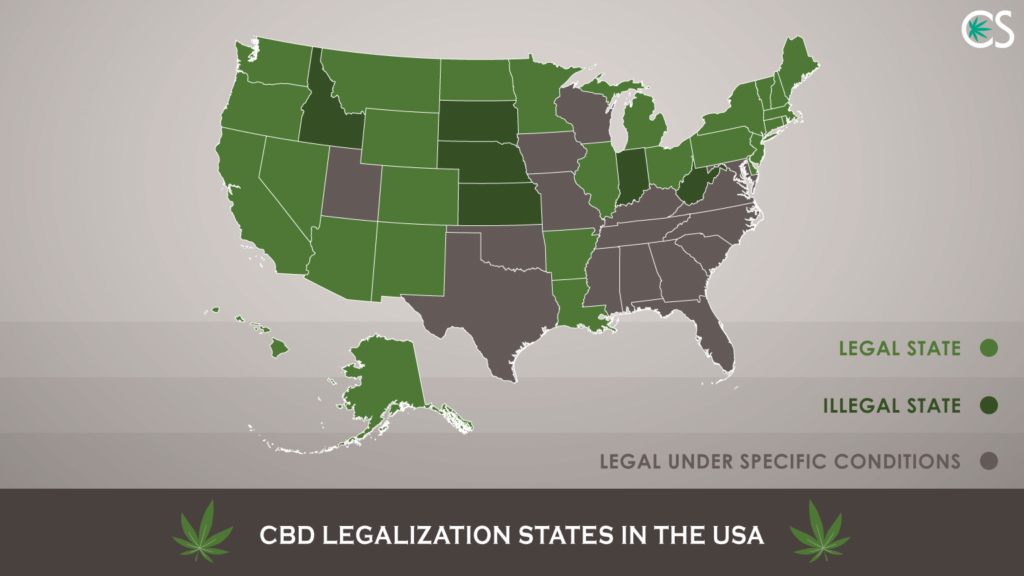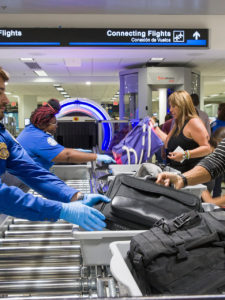
Many of us have come to depend on CBD to feel better, sleep better, and stay healthy, and it can be especially helpful given the stress and strain of travel. Traveling with CBD, however, comes with its own set of issues and concerns. In this article we’ll take a look at what’s allowed and what isn’t, and provide some tips to make traveling with CBD as stress-free as possible.
CBD is a natural and safe compound with many well-documented health benefits. According to a 2017 WHO report on cannabidiol, even doses as high as 1,500 mg CBD daily are well tolerated in humans.
While many places around the world consider cannabis an illicit substance, CBD is legal in most countries. However, because CBD is extracted from the cannabis plant — and there are more than one species in this family — its legality isn’t unconditional everywhere. This situation complicates many areas of using CBD, from possession to buying to traveling with your CBD products around the world.
Understanding CBD
In order to understand why there’s so much confusion around the legal status of CBD around the world, it’s important to know the difference between its two sources — hemp and marijuana.
On a molecular level, CBD is CBD no matter the source. It’s the same compound with the same chemical structure and effects. But when it comes to the effects and legality of different CBD products, the source becomes important.

Despite coming from the same plant family — Cannabis sativa L. — hemp and marijuana are two different plants. While marijuana boasts high concentrations of THC and usually low-to-high levels of CBD (depending on its genetics), hemp plants are rich in CBD and contain only trace amounts of THC (usually less than 0.3%).
This means that while consuming marijuana and marijuana-infused products can give you psychoactive effects, hemp will not due to its low THC content. Because of this, governments around the world have different regulations for both plants.
CBD products from hemp are usually labeled as “health supplements,” meaning that you can buy them over the counter. On top of that, hemp has many other applications, including food, fiber, textiles, biofuel, building materials (hempcrete). Marijuana is typically harvested for medical and recreational use.
Traveling with CBD Around the USA: Federal and State Laws
The 2018 Farm Bill has made traveling with CBD around the USA much easier. Hemp has been removed from the Controlled Substances Act and is now considered an agricultural crop. In other words, hemp and hemp-derived CBD goods are legal in all 50 states as long as they contain less than 0.3% THC.
As with most federal regulations, states can either adapt to the national law or introduce their own changes. In some states, CBD is legal under certain conditions, but before we elaborate on that, let’s take a look at what the US Travel Security Agency says about traveling with CBD. The TSA’s Policy Surrounding Traveling with CBD:

“Marijuana and certain cannabis infused products, including some Cannabidiol (CBD) oil, remain illegal under federal law, except for products that contain no more than 0.3 percent THC on a dry weight basis or that are approved by FDA.”
Given this policy, as long as CBD oil comes from hemp and has less than 0.3%, you can fly with it between states. Because hemp naturally has high amounts of CBD and very little THC, the majority of CBD products are extracted from hemp plants. This allows manufacturers to sell them without facing potential legal problems. Consumers, on the other hand, can enjoy the benefits of CBD without experiencing the psychoactive side of cannabis.
However, not all CBD oil is sourced from hemp. As mentioned, CBD can also be extracted from marijuana. Some people prefer more THC content because of the enhanced synergy coming from the full spectrum of cannabinoids, and in some states, marijuana is legal.
If this definition fits your CBD oil, then you certainly don’t want to take it on a plane. Traveling with marijuana-derived CBD from one state to another is a federal offense — even if marijuana is legal in both states.
As of this writing, hemp-derived CBD is legal at the federal level , but individual states have varying degrees of legality. While some states allow full recreational use of hemp-derived CBD others prohibit it’s use under any circumstance. As these laws are ever-changing, it’s best to do a bit of homework before traveling to educate yourself on the current laws in the states to which you’ll travel. This page on the CBD School website has an excellent and updated list of all current state laws regarding hemp-derived CBD.
Traveling Internationally with CBD
Since international laws are numerous, varied and subject to change at any time it would not be responsible to provide a definitive set of guidelines in this article, but rather than general guidelines for international travel with CBD.
The legality of CBD in the jurisdiction you are traveling to is the most important factor to consider. At this point in time, several countries around the world have effectively legalized both recreational and medical cannabis in its various forms. Folks traveling abroad must carefully research and understand the laws of the country(ies) they are visiting to be sure that they are complying with the current laws.
The surest way to find out if CBD is legal in the country you are traveling to is by speaking to a customs agent or an embassy official. You may also be able to receive assistance from airline or airport officials. As CBD gains more acceptance across the globe, laws are subject to change, so checking them on a regular basis may not be a bad idea.
Ways of Traveling with CBD – What To Know
People use different means of transportation for traveling with CBD. Some of them only require you to know your local laws, whereas others call for more thorough research.
Traveling by Car
If you’re planning to travel by car, there’s little to worry about beyond a proper understanding of the local law in the states/countries to which you’ll be traveling. As long as the THC content is below the legal limit, you’re safe. And since hemp-derived CBD is treated differently than CBD products from marijuana, you don’t need to carry it in a closed container or declare your possession if you get stopped. Carrying CBD is not a ticketable offense if CBD is legal in your country.
Traveling By Train or Other Mass Transit
Similar rules apply to traveling with CBD by train and other mass transit. Hemp-derived CBD with a legal amount of CBD is fine to bring on trains and buses if you are traveling within the borders of your country. For trains and buses using international connections, we recommend checking with the regulations surrounding hemp CBD products in your destinations because some countries only allow them under certain conditions.

Traveling by Plane
The first thing to remember is that CBD, like all other substance, is subject to TSA restrictions regarding the transport of liquids in carry-on luggage. While normally not an issue for CBD oil (30mL is most common) you must still adhere to all current TSA guidelines.
CBD was made legal by the 2018 Farm Act. Since it is no longer a controlled substance you can now legally fly with CBD. The TSA (Transportation Security Administration) has separate rules regarding medical marijuana. It’s banned on flights so you can’t take it with you. CBD derived from marijuana is illegal under these rules. CBD is not illegal if it’s derived from hemp.
Cruise Ships
Whether CBD is allowed onboard or not will solely depend on the cruise liner. Every cruise line has its own policies regarding CBD, independent of local, state, federal and international laws.
As of this writing, the following cruise lines expressly prohibit any form of CBD on their ships: Celebrity Cruises, Disney Cruise Line, Azamara, Princess Cruises, Regent Seven Seas Cruises, Carnival Cruise Line, Royal Caribbean, Norwegian Cruise Line, Oceania Cruises.
These policies and regulations are obviously subject to change, so it’s best to check with your cruise line before departing to double-check their current policies.
Final Tips/Suggestions for Traveling with CBD
- Review the CBD policy for your destination before you depart: If you’ve read this far then you understand that this should be your top priority if you don’t want to end up on the wrong side of the law when arriving at your destination
- Research additional limits on CBD: Does your cruise line allow CBD on board? Can you bring full-spectrum products into your destination? Or does the country only allow CBD isolates? The fact CBD is legal where you travel to doesn’t mean you can go all out and use every form of CBD there.
- Bring your product’s CoA with you: The certificate of analysis is a lab report confirming the cannabinoid profile of your product. It’s the only way to prove that your CBD has the legal amount of THC during any security check. You should be able to get this CoA from either the manufacturer’s website or by scanning a QR code on the bottle itself.
- Buy travel-size CBD: This is particularly important for liquid limits. Since most people take CBD in the form of oil drops, they will be subjected to standard airport liquid restrictions; airports usually allow travelers to bring 100 ml bottles on board.
- Leave your CBD at home: If CBD is legal in your country/state of origin but you can’t confirm the legality in the country/state to which you are traveling, your best option may be to leave your CBD oil at home and research your opportunities to buy a replacement oil somewhere upon arrival.
Final Thoughts
While many people are still concerned with the legality of traveling with CBD, it has become more and more commonplace and thus less likely to cause you any issues, provided you are prepared and armed with the knowledge you need. Bottom line: always have a certificate of analysis at hand, and above all, remember to research the laws regarding CBD in all of the areas to which you plan to travel.
PLEASE NOTE
The contents of this blog are provided for informational purposes only and are not intended as a substitute for the consultation, diagnosis and/or medical advice and treatment of a qualified physician or healthcare professional. As with any product, please consult your care provider if you have any concerns prior to use.



